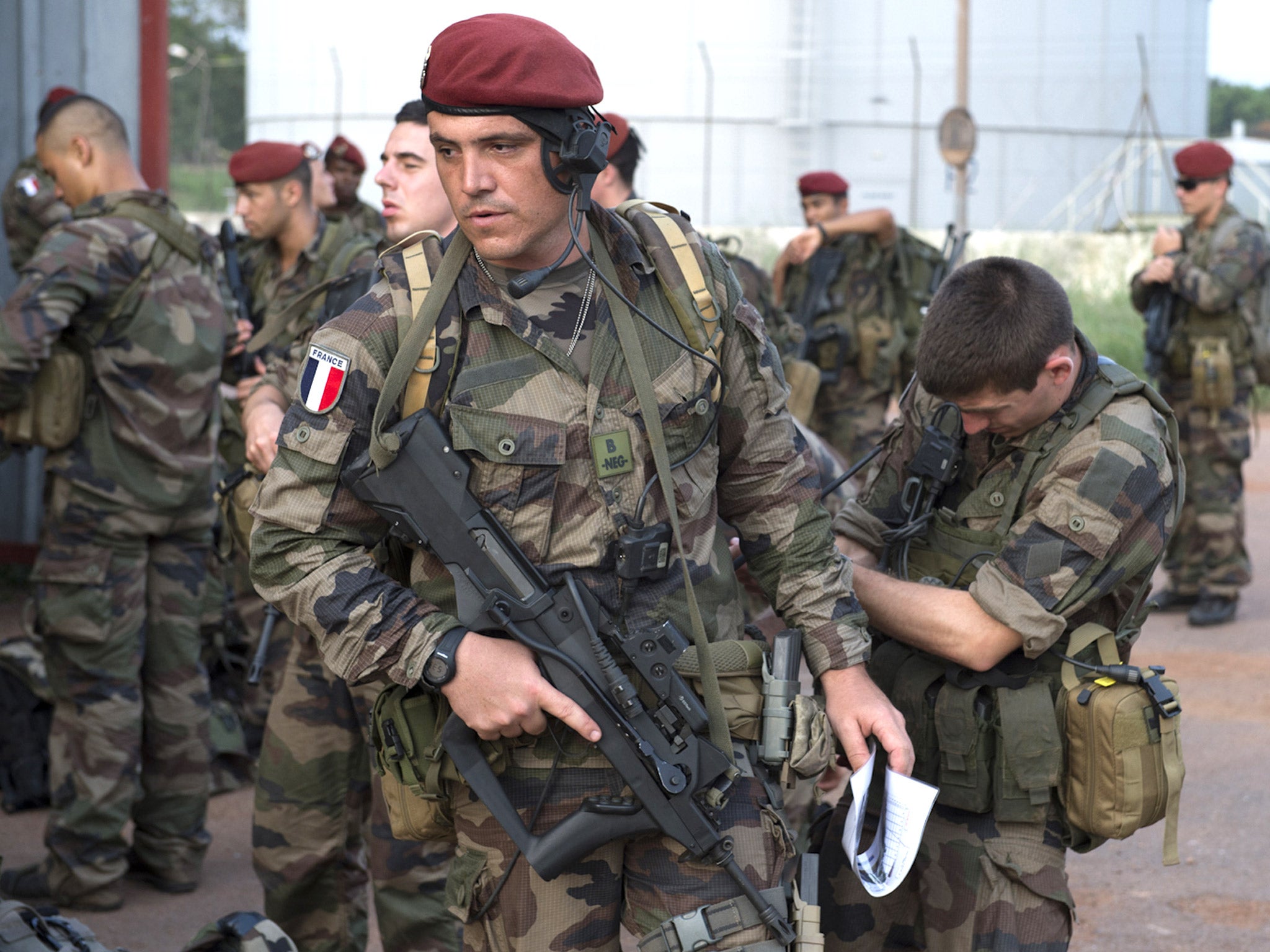France sends in troops to Central African Republic to stop 'another Rwanda' as conflict threatens to explode into Muslim-Christan war
Deployment is likely to win UN Security Council approval

Your support helps us to tell the story
From reproductive rights to climate change to Big Tech, The Independent is on the ground when the story is developing. Whether it's investigating the financials of Elon Musk's pro-Trump PAC or producing our latest documentary, 'The A Word', which shines a light on the American women fighting for reproductive rights, we know how important it is to parse out the facts from the messaging.
At such a critical moment in US history, we need reporters on the ground. Your donation allows us to keep sending journalists to speak to both sides of the story.
The Independent is trusted by Americans across the entire political spectrum. And unlike many other quality news outlets, we choose not to lock Americans out of our reporting and analysis with paywalls. We believe quality journalism should be available to everyone, paid for by those who can afford it.
Your support makes all the difference.France is to send 1,000 soldiers to the Central African Republic to try to contain a conflict which threatens to explode into a vicious Muslim-Christan civil war.
The deployment – the second French intervention in Africa this year – is likely to win UN Security Council approval in the next few days. The French Defence Minister, Jean-Yves le Drian, spoke of a “short mission to allow calm and stability to return” after the overthrow of the President eight months ago.
“The Central African Republic is in a state of collapse and we cannot allow a country to fall apart like that, with the risk of violence, massacres and humanitarian chaos, ” Mr Le Drian said.
Both sides have accused each other of atrocities since a Muslim rebel alliance overthrew a Christian president in March. There have been reports of massacres, rape and the conscription of child soldiers by the rebel forces.
Over a million people, in a country of 4.4 million, are facing famine. An estimated 400,000 people have been forced from their homes and 68,000 have fled to neighbouring countries.
The UN Deputy Secretary-General Jan Eliasson told the Security Council on Monday that the CAR was becoming a “breeding ground for extremists and armed groups” and could descend into a full-scale civil war between Muslim and Christian communities. UN officials have warned of the “potential for another Rwanda”.
Mr Eliasson suggested that the deployment of a UN peacekeeping force of up to 9,000 troops might now be inevitable. The new French force will join the 400 French soldiers on the ground in a six-month “bridging operation” before a large peacekeeping operation by the African Union begins next month.
A draft UN Security Council resolution is expected to call on the Secretary General Ban Ki-moon to prepare plans for a possible UN intervention within three months.
French interventions in Africa have a tendency to last longer than initially announced, such as that in Mali in January. Mr Le Drian rejected any comparisons between the operations. “In Mali there was an attack by jihadists who wanted to transform Mali into a terrorist state,” he said. “This is a collapse of a country with a potential for religious conflict. France has international responsibilities.”
The CAR is one the poorest countries in the world There have long been religious and economic tensions between Muslims, who are traditionally livestock farmers, and broadly wealthier Christians, who are mostly crop-growers.
In March, President François Bozizé was overthrown by a coalition of two Muslim groups called “Seleka” (alliance). Mr Bozizé’s supporters called for continuing resistance against the rebels whom they accused of being mostly foreign jihadists.
Michel Djotodia, the rebel leader, who proclaimed himself to be the country’s first ever Muslim President, has promised to preserve the country’s secular traditions. His Seleka forces have been accused, however, of pillaging churches and massacring Christian communities. Some diplomatic sources estimate that 80 per cent of the Seleka fighters come from Central Africa’s northern neighbours, Sudan and Chad.
An African Union intervention force, over 3,000 strong, is supposed to begin full-scale operations next month. Senior UN officials have dismissed the force as “under-equipped and under-financed”. Instead of protecting the civilian population, they say, the soldiers have been selling their services to private companies.
Central African Republic in numbers
1 million people are facing famine
400,000 people have fled their homes
68,000 have fled to neighbouring countries
Join our commenting forum
Join thought-provoking conversations, follow other Independent readers and see their replies
Comments